Toward a more Efficient Knowledge Network in Innovation Ecosystems: A Simulated Study on Knowledge Management
Abstract
1. Introduction
2. Literature Review
2.1. The Impact of Network Characteristics on Knowledge Diffusion
2.2. The Impact of Knowledge Networks on Knowledge Diffusion
3. Modeling the Process of Knowledge Diffusion among Clustered Firms
3.1. Rules of Knowledge Interactions/Diffusion
3.2. Constructing a Knowledge Network
3.2.1. Basic Assumptions
3.2.2. Constructing Different Knowledge Networks
3.3. Measuring Knowledge Diffusion Efficiency
4. Simulation and Results
4.1. Setting of Parameters
4.2. Methodological Procedures
4.3. The Accumulation of Knowledge in Clustered Firms
4.4. The Dispersion of Knowledge in Clustered Firms
5. Sensitivity Analysis
5.1. Analysis of the Reliability of the Method
5.2. Effect of the Degree of Node
5.3. Effect of Knowledge Interaction Rules
5.4. Effect of Performance Indexes
6. Discussion and Conclusions
6.1. Discussion
6.2. Managerial Implications
6.3. Contributions
6.4. Limitations and Future Research
Author Contributions
Funding
Conflicts of Interest
References
- Drucker, P.F. Post-Capitalist Society; Harper Collins: New York, NY, USA, 1993. [Google Scholar]
- Lai, Y.; Hsu, M.; Lin, F.; Chen, Y.; Lin, Y. The effects of industry cluster knowledge management on innovation performance. J. Bus. Res. 2014, 67, 734–739. [Google Scholar] [CrossRef]
- Ma, Z.; Yu, K. Research paradigms of contemporary knowledge management studies: 1998–2007. J. Knowl. Manag. 2010, 14, 175–189. [Google Scholar] [CrossRef]
- Nonaka, I. The knowledge creating company. Harv. Bus. Rev. 1991, 69, 96–104. [Google Scholar]
- Nowacki, R.; Bachnik, K. Innovations within knowledge management. J. Bus. Res. 2016, 69, 1577–1581. [Google Scholar] [CrossRef]
- Yin, J.; Ma, Z.; Yu, H.; Jia, M.; Liao, G. Transformational leadership and employee knowledge sharing: Explore the mediating roles of psychological safety and team efficacy. J. Knowl. Manag. 2020, 24, 150–171. [Google Scholar]
- Yu, H.; Shang, Y.; Wang, N.; Ma, Z. The mediating effect of decision quality on knowledge management and firm performance for Chinese entrepreneurs: An empirical study. Sustainability 2019, 11, 3660. [Google Scholar] [CrossRef]
- Grimaldi, M.; Rippa, P.; Ruffolo, M. A methodology to evaluate the organizational impact of IT on knowledge management: An Italian case study. J. Inf. Technol. Case Appl. Res. 2008, 10, 8–24. [Google Scholar] [CrossRef]
- Grant, R.M. Toward a knowledge-based theory of the firm. Strateg. Manag. J. 1996, 17, 109–122. [Google Scholar] [CrossRef]
- Ma, Z.; Huang, Y.; Wu, J.; Dong, W.; Qi, L. What matters for knowledge sharing in collectivistic cultures? Empirical evidence from China. J. Knowl. Manag. 2014, 18, 1004–1019. [Google Scholar]
- Ma, Z.; Tang, H. Network structure and knowledge sharing efficiency in industrial alliances: Where is the fit? In Proceedings of the Annual Meeting of the Administrative Sciences Association of Canada, Toronto, CA, Canada, 27–29 May 2018. [Google Scholar]
- Nonaka, I.; Takeuchi, H. The Knowledge-Creating Company: How Japanese Companies Create the Dynamics of Innovation; Oxford University Press: New York, NY, USA, 1995. [Google Scholar]
- Abrahamson, E.; Rosenkopf, L. Social network effects on the extent of innovation diffusion: A computer simulation. Organ. Sci. 1997, 8, 289–309. [Google Scholar] [CrossRef]
- Mueller, M.; Bogner, K.; Buchmann, T.; Kudic, M. The effect of structural disparities on knowledge diffusion in networks: An agent-based simulation model. J. Econ. Interact. Coord. 2017, 12, 613–634. [Google Scholar] [CrossRef]
- Koch, T.; Windsperger, J. Seeing through the network: Competitive advantage in the digital economy. J. Organ. Des. 2017, 6. [Google Scholar] [CrossRef]
- Ma, Z.; Jin, Q. Success factors for product innovation in China’s manufacturing sector: Strategic choice and environment constraints. Int. Stud. Manag. Organ. 2019, 49, 213–231. [Google Scholar] [CrossRef]
- Lusch, R.F.; Vargo, S.I.; Gustafsson, A. Fostering a trans-disciplinary perspective of service ecosystems. J. Bus. Res. 2016, 69, 2957–2963. [Google Scholar] [CrossRef]
- Ma, Z.; Lee, Y. Patent application and technological collaboration in inventive activities: 1980–2005. Technovation 2008, 28, 379–390. [Google Scholar] [CrossRef]
- Burt, R.S. Social contagion and innovation: Cohesion versus structural equivalence. Am. J. Sociol. 1987, 92, 1287–1335. [Google Scholar] [CrossRef]
- Cowan, R.; Jonard, N. Network structure and the diffusion of knowledge. J. Econ. Dyn. Control 2004, 28, 1557–1575. [Google Scholar] [CrossRef]
- Lin, C.; Wu, J.-C.; Yen, D.C. Explore barriers to knowledge flow at different knowledge management maturity stages. Inf. Manag. 2012, 49, 10–23. [Google Scholar] [CrossRef]
- Capaldo, A. Network structure and innovation: The leveraging of a dual network as a distinctive relational capability. Strateg. Manag. J. 2007, 28, 585–608. [Google Scholar] [CrossRef]
- Cowan, R.; Jonard, N. Network architecture, barter exchange and the diffusion of ideas. Int. J. Agric. Res. Gov. Ecol. 2007, 6, 165–178. [Google Scholar] [CrossRef]
- Cowan, R.; Jonard, N. Structural holes, innovation and the distribution of ideas. J. Econ. Interact. Coord. 2017, 2, 93–110. [Google Scholar] [CrossRef]
- Schilling, M.A.; Phelps, C.C. Interfirm collaboration networks: The impact of large-scale network structure on firm innovation. Manag. Sci. 2007, 53, 1113–1126. [Google Scholar] [CrossRef]
- Ahuja, G. Collaboration networks, structural holes, and innovation: A longitudinal study. Adm. Sci. Q. 2000, 45, 425–455. [Google Scholar] [CrossRef]
- Owen-Smith, J.; Powell, W.W. Knowledge networks as channels and conduits: The effects of spillovers in the Boston biotechnology community. Organ. Sci. 2004, 15, 5–21. [Google Scholar] [CrossRef]
- Bell, D. Modes of exchange: Gift and commodity. J. Socio-Econ. 1991, 20, 155–167. [Google Scholar] [CrossRef]
- Wright, M.; Liu, X.; Buck, T.; Filatotchev, I. Returnee entrepreneurs, science park location and performance: An analysis of high-technology SMEs in China. Entrep. Theory Pract. 2008, 32, 131–155. [Google Scholar] [CrossRef]
- Iandoli, L.; Ponsiglione, C.; Marchione, E.; Zollo, G. Knowledge exchange processes in industrial districts and the emergence of networks. Cent. Eur. J. Oper. Res. 2012, 20, 231–250. [Google Scholar] [CrossRef]
- Ponsiglione, C.; Quinto, I.; Zollo, G. Regional innovation systems as complex adaptive systems: The case of lagging European regions. Sustainability 2018, 10, 2862. [Google Scholar] [CrossRef]
- Van Egeraat, C.; Curran, D. Social networks and actual knowledge flow in the Irish bio-tech industry. Eur. Plan. Stud. 2014, 22, 1109–1126. [Google Scholar] [CrossRef][Green Version]
- Kim, T.H.; Lee, J.-N.; Chun, J.U.; Benbasat, I. Understanding the effect of knowledge management strategies on knowledge management performance: A contingency perspective. Inf. Manag. 2014, 51, 398–416. [Google Scholar] [CrossRef]
- Powell, W. Neither market nor hierarchy. Res. Organ. Behav. 1990, 12, 295–336. [Google Scholar]
- Gay, B.; Dousset, B. Innovation and network structural dynamics: Study of the alliance network of a major sector of the biotechnology industry. Res. Policy 2005, 34, 1457–1475. [Google Scholar] [CrossRef]
- Zheng, X.; Zhao, Y. The impact of alliance network structure on firm innovation capability: An empirical study of ten high-tech industries in China. J. Sci. Technol. Policy China 2013, 4, 4–19. [Google Scholar] [CrossRef]
- Collins, C.J.; Smith, K.G. Knowledge exchange and combination: The role of human resource practices in the performance of high-technology firms. Acad. Manag. J. 2006, 49, 544–560. [Google Scholar] [CrossRef]
- Dyer, J.H.; Singh, H. The relational view: Cooperative strategy and sources of inter-organizational competitive advantage. Acad. Manag. Rev. 1998, 23, 660–679. [Google Scholar] [CrossRef]
- Granovetter, M. Economic action and social structure: The problem of embeddedness. Am. J. Sociol. 1985, 91, 481–510. [Google Scholar] [CrossRef]
- Hansen, M.T. The search-transfer problem: The role of weak ties in sharing knowledge across organization subunits. Adm. Sci. Q. 1999, 44, 82–111. [Google Scholar] [CrossRef]
- McFadyen, M.A.; Cannella, A.A. Social capital and knowledge creation: Diminishing returns of the number and strength of exchange relationships. Acad. Manag. J. 2004, 47, 735–746. [Google Scholar]
- Moran, P. Structural vs. relational embeddedness: Social capital and managerial performance. Strateg. Manag. J. 2005, 26, 1129–1151. [Google Scholar] [CrossRef]
- Uzzi, B. Social structure and competition in interfirm networks: The paradox of embeddedness. Adm. Sci. Q. 1997, 42, 35–67. [Google Scholar] [CrossRef]
- Zander, U.; Kogut, B. Knowledge and the speed of the transfer and imitation of organizational capabilities: An empirical test. Organ. Sci. 1995, 6, 76–92. [Google Scholar] [CrossRef]
- Koka, B.R.; Prescott, J.E. Designing alliance networks: The influence of network position, environmental change, and strategy on firm performance. Strateg. Manag. J. 2008, 29, 639–661. [Google Scholar] [CrossRef]
- Henning, C.; Saggau, V. Networks, knowledge spillovers and technological progress of firms: Simulations in an evolutionary framework. Int. J. Innov. Technol. Manag. 2013, 10, 1340018. [Google Scholar] [CrossRef]
- Burt, R.S. Attachment, decay, and social network. J. Organ. Behav. 2001, 22, 619–643. [Google Scholar] [CrossRef]
- Belso-Martinez, J.A.; Diez-Vial, I. Firm’s strategic choices and network knowledge dynamics: How do they affect innovation? J. Knowl. Manag. 2018, 22, 1–20. [Google Scholar]
- Martin, R. Differentiated knowledge bases and the nature of innovation networks. Eur. Plan. Stud. 2013, 21, 1418–1436. [Google Scholar] [CrossRef][Green Version]
- Delre, S.A.; Jager, W.; Janssen, M.A. Diffusion dynamics in small-world networks with heterogeneous consumers. Comput. Math. Organ. Theory 2007, 13, 185–202. [Google Scholar] [CrossRef]
- Morone, P.; Taylor, R. Knowledge diffusion dynamics and network properties of face-to-face interactions. J. Evol. Econ. 2004, 14, 327–351. [Google Scholar] [CrossRef]
- Singh, J.; Hansen, M.T.; Podolny, J.M. The world is not small for everyone: Inequity in searching for knowledge in organizations. Manag. Sci. 2010, 56, 1415–1438. [Google Scholar] [CrossRef]
- Lovejoy, W.S.; Sinha, A. Efficient structures for innovative social networks. Manag. Sci. 2010, 56, 1127–1145. [Google Scholar] [CrossRef]
- Cowan, R.; Jonard, N. Knowledge portfolios and the organization of innovation networks. Acad. Manag. Rev. 2009, 34, 320–342. [Google Scholar]
- Nieves, J.; Osorio, J. The role of social networks in knowledge creation. Knowl. Manag. Res. Pract. 2013, 11, 62–77. [Google Scholar] [CrossRef]
- Baggio, R.; Cooper, C. Knowledge transfer in a tourism destination: The effects of a network structure. Serv. Ind. J. 2010, 30, 1757–1771. [Google Scholar] [CrossRef]
- Vragović, I.; Louis, E.; Díaz-Guilera, A. Efficiency of informational transfer in regular and complex networks. Phys. Rev. E 2005, 71, 036122. [Google Scholar] [CrossRef]
- Latora, V.; Marchiori, M. Efficient behavior of small-world networks. Phys. Rev. Lett. 2001, 87, 198701. [Google Scholar] [CrossRef] [PubMed]
- Wang, C.C.; Sung, H.Y.; Chen, D.Z.; Huang, M.H. Strong ties and weak ties of the knowledge spillover network in the semiconductor industry. Technol. Forecast. Soc. Chang. 2017, 118, 114–127. [Google Scholar] [CrossRef]
- Molina-Morales, F.X.; Martínez-Fernández, M.T. Social networks: Effects of social capital on firm innovation. J. Small Bus. Manag. 2010, 48, 258–279. [Google Scholar] [CrossRef]
- Zhang, Y.; Li, X.; Aziz-alaoui, M.A.; Bertelle, C.; Guan, J.; Zhou, S. Knowledge diffusion in complex networks. Concurr. Comput. Pract. Exp. 2017, 29, 1–13. [Google Scholar] [CrossRef]
- Hernandez, E.; Menon, A. Acquisitions, Node Collapse, and Network Revolution. Available online: https://faculty.wharton.upenn.edu/wp-content/uploads/2016/10/hernandez-menon-ms.pdf (accessed on 5 August 2020).
- Hasan 2017, S.; Bagde, S. Peers and network growth: Evidence from a natural experiment. Manag. Sci. 2015, 61, 2536–2547. [Google Scholar] [CrossRef]
- Lewin, K. Field Theory in Social Science: Selected Theoretical Papers by Kurt Lewin; Harper & Brothers: New York, NY, USA, 1951. [Google Scholar]
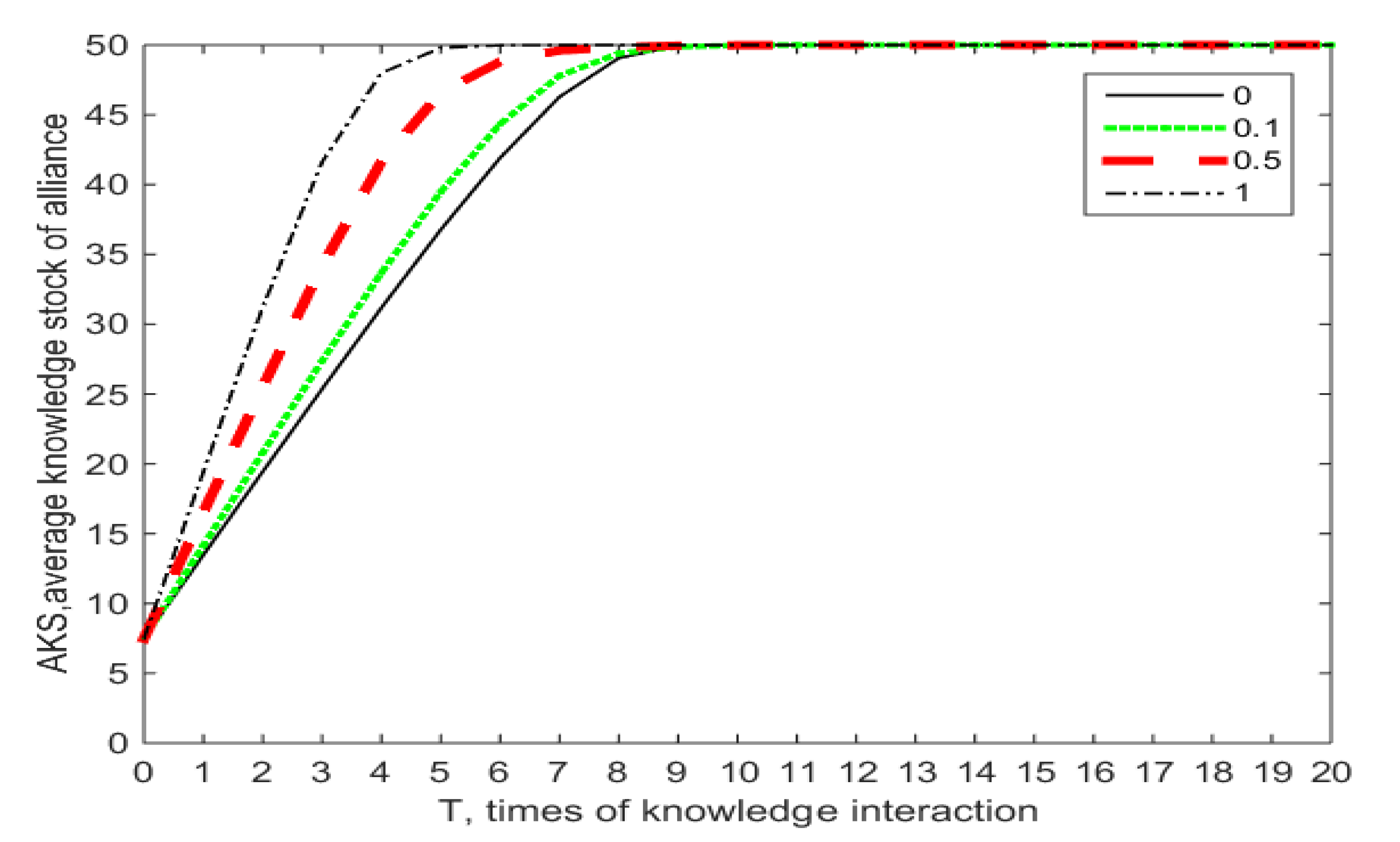
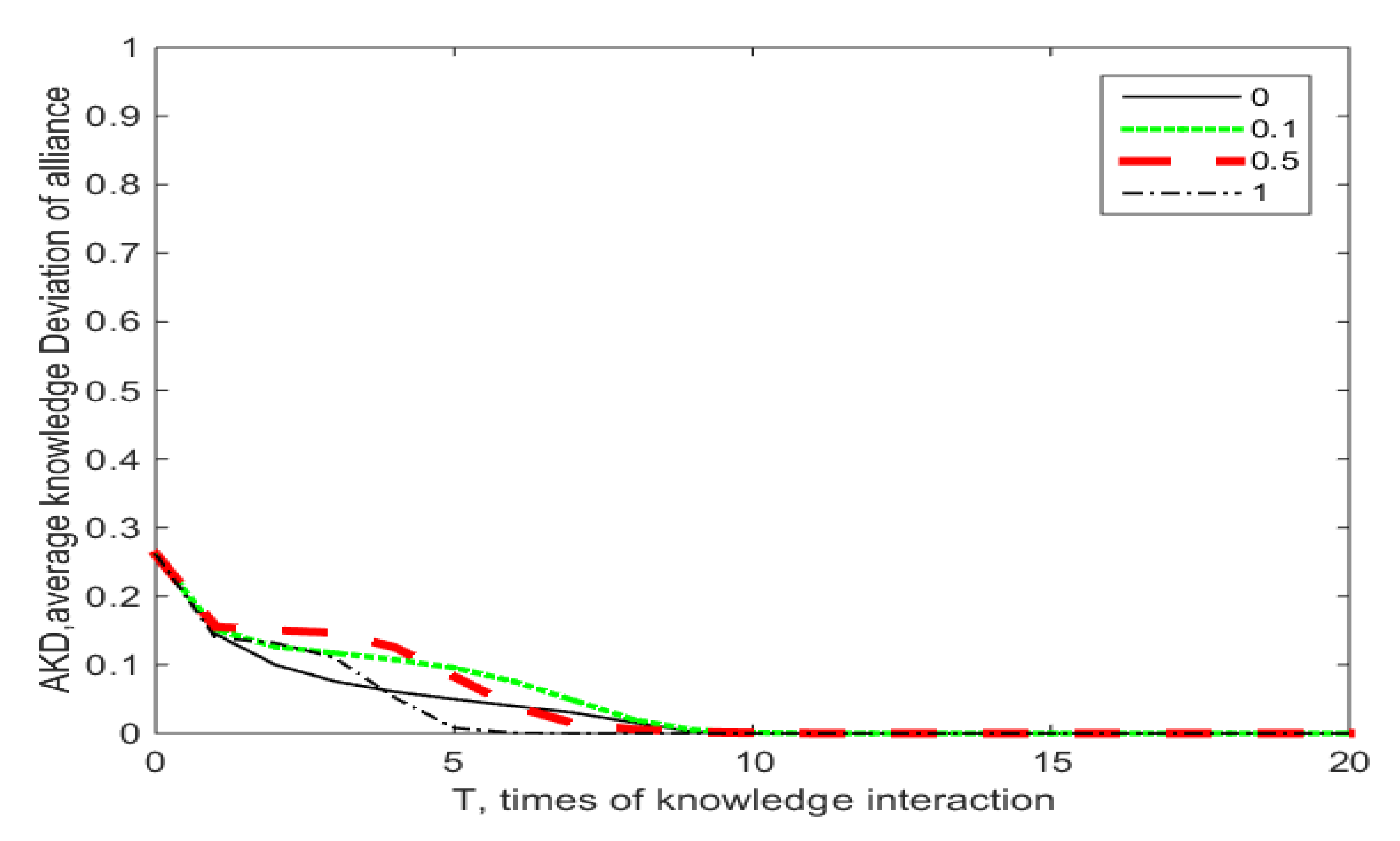

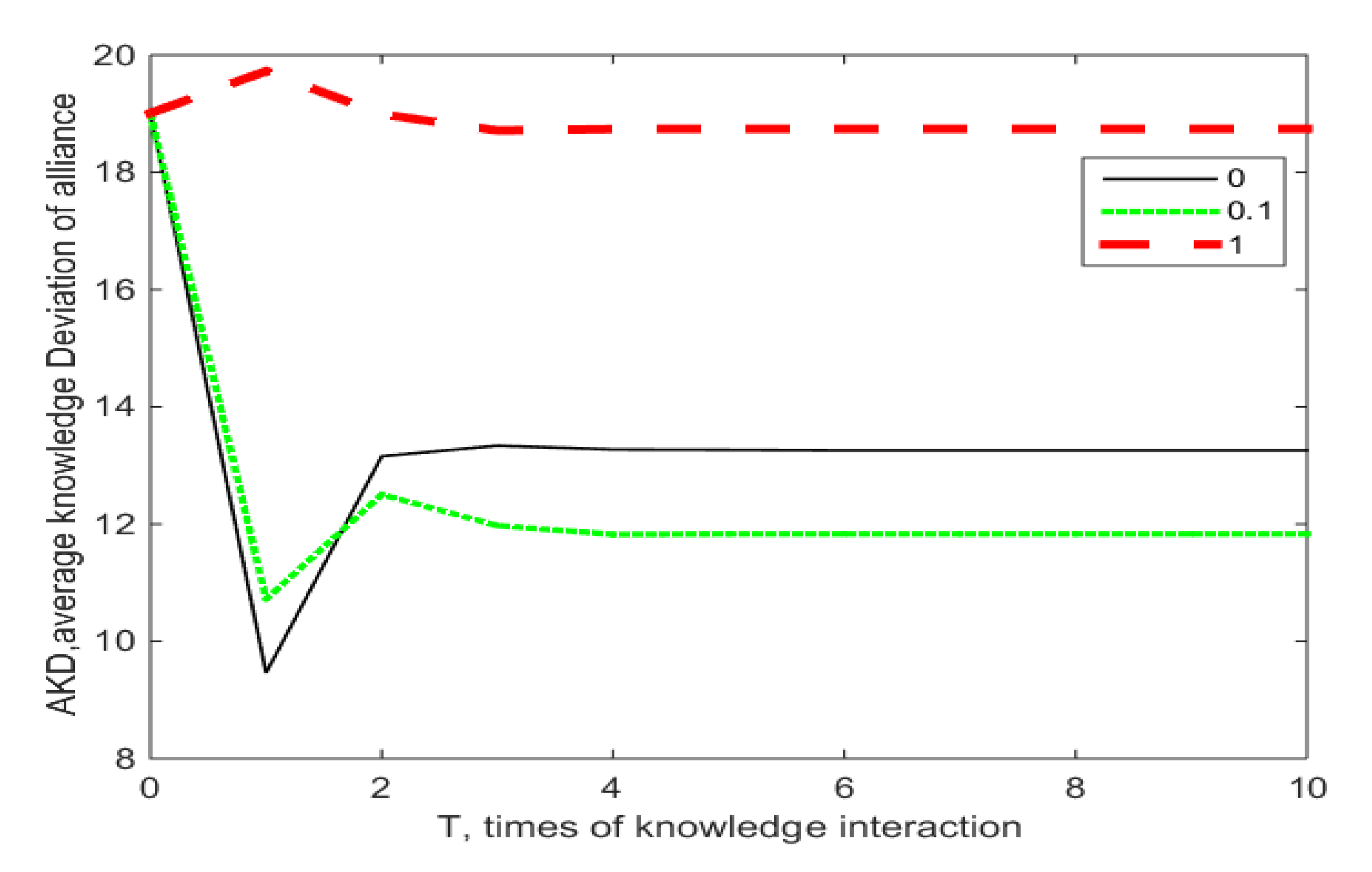

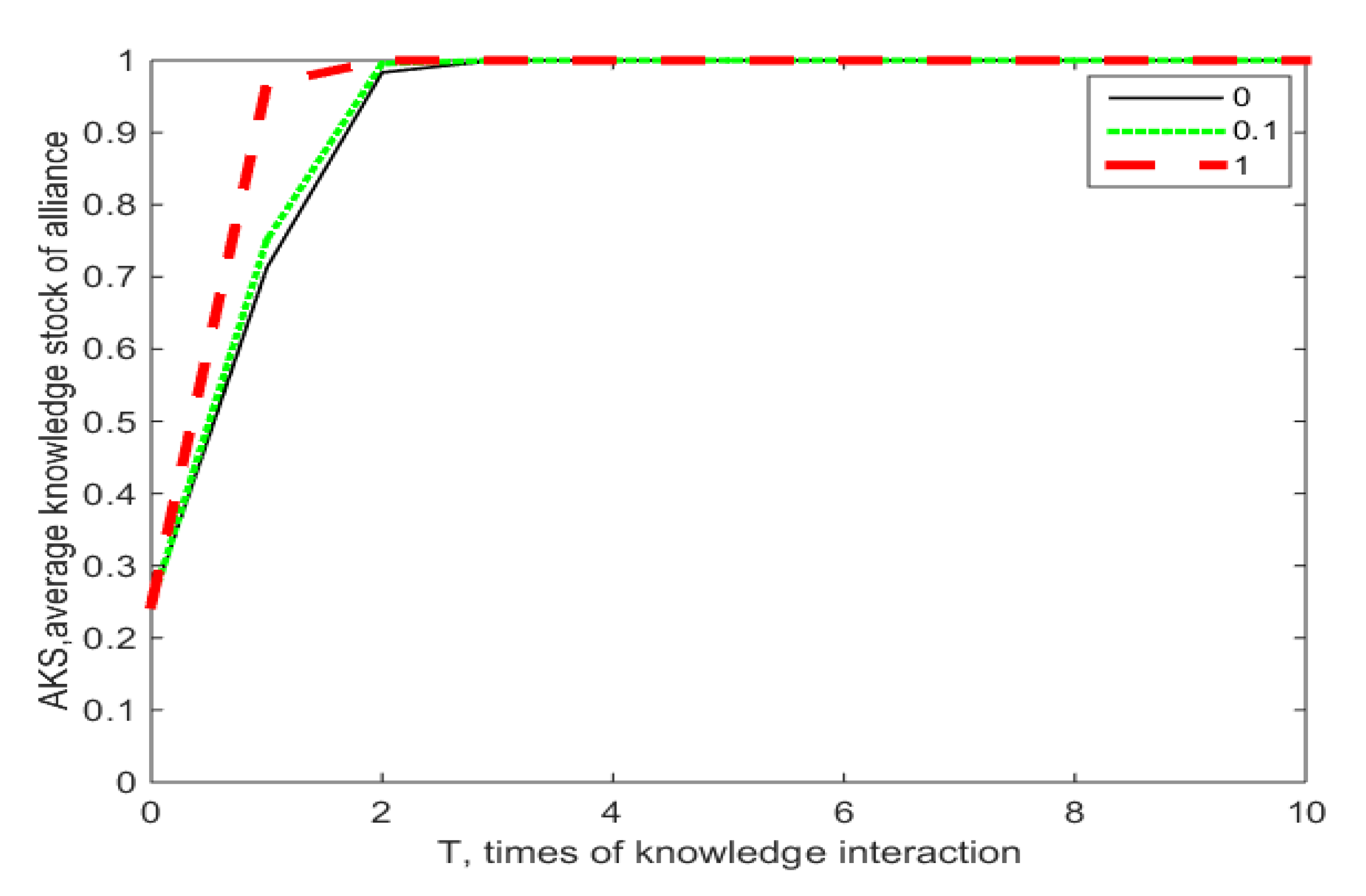
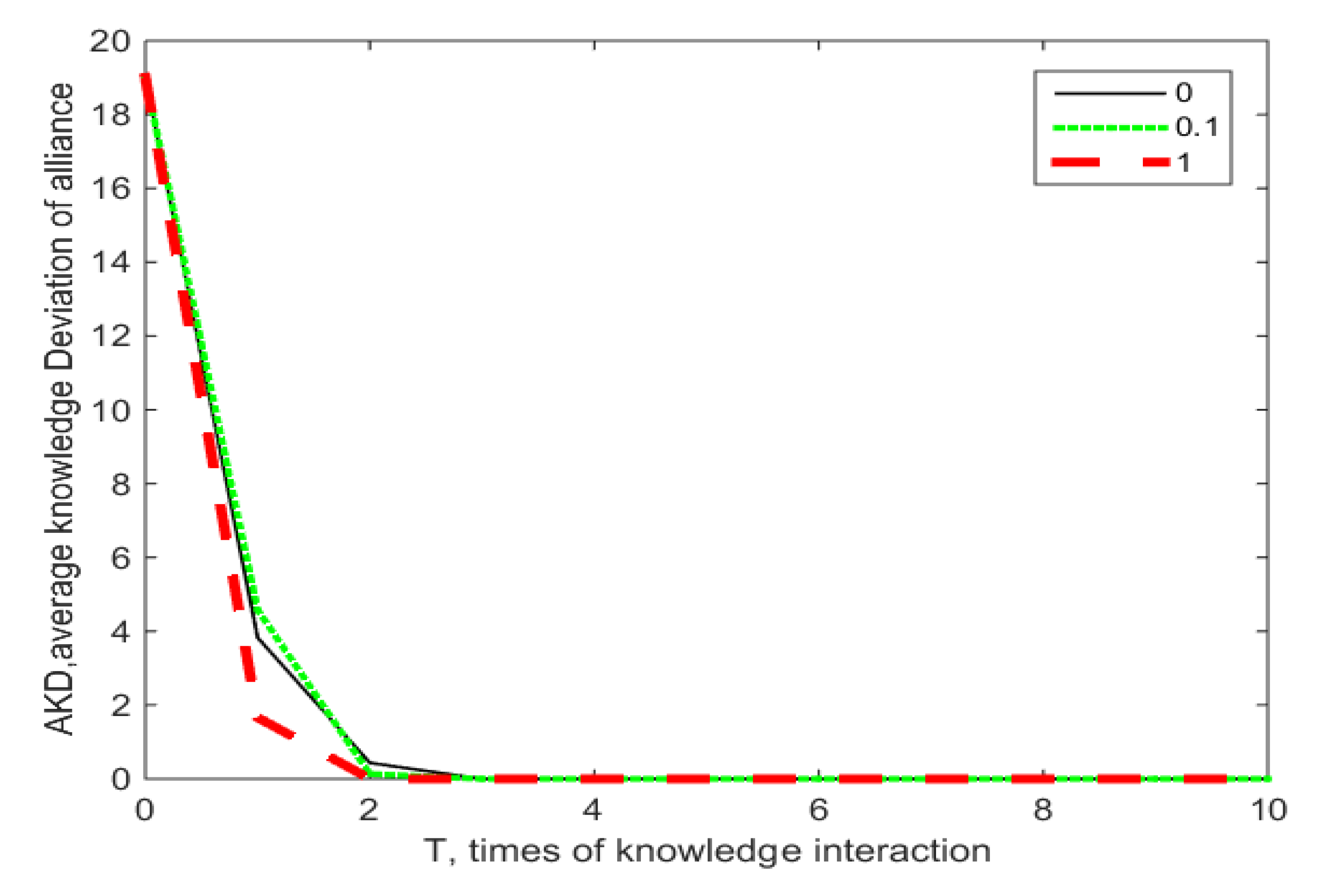
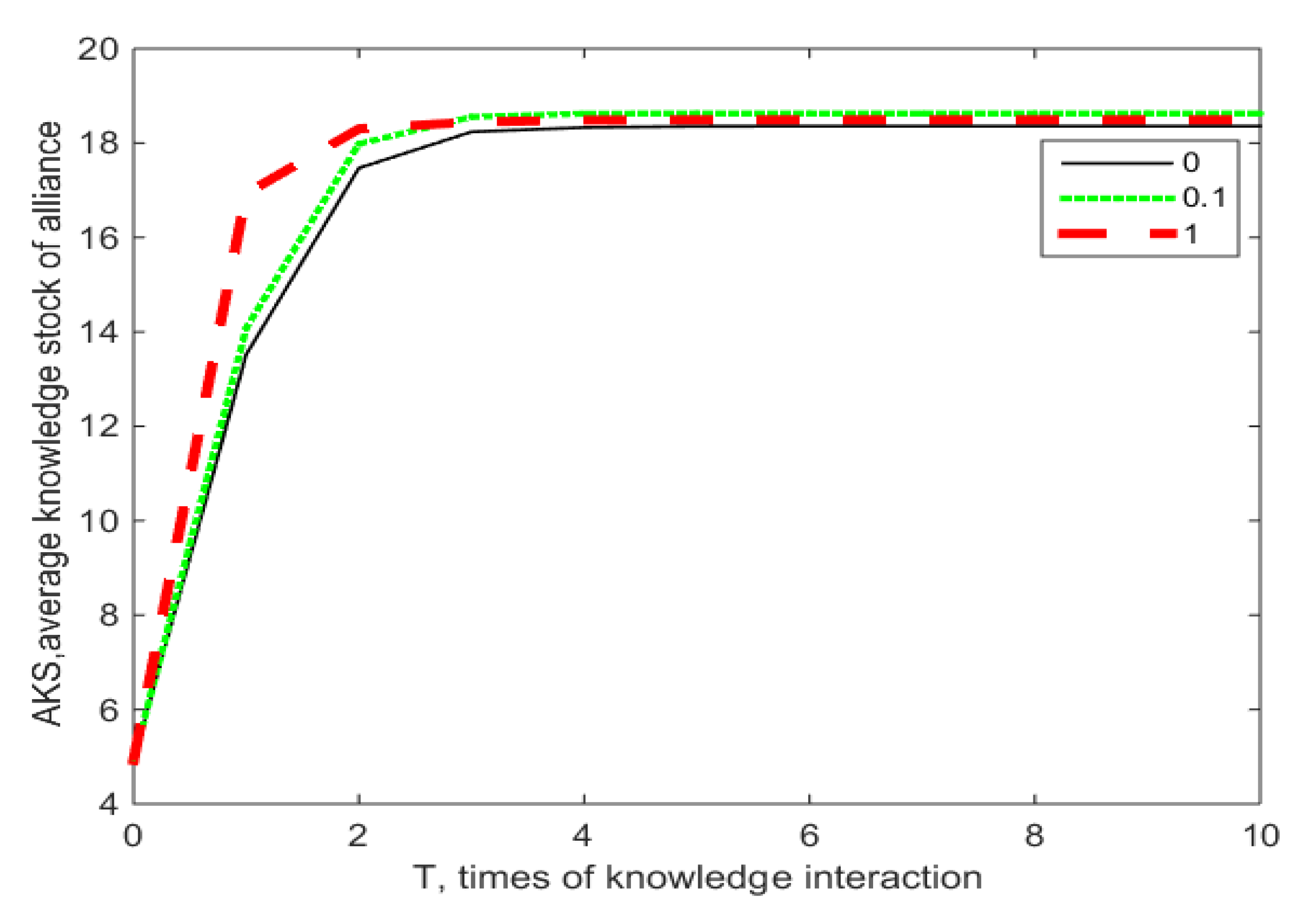
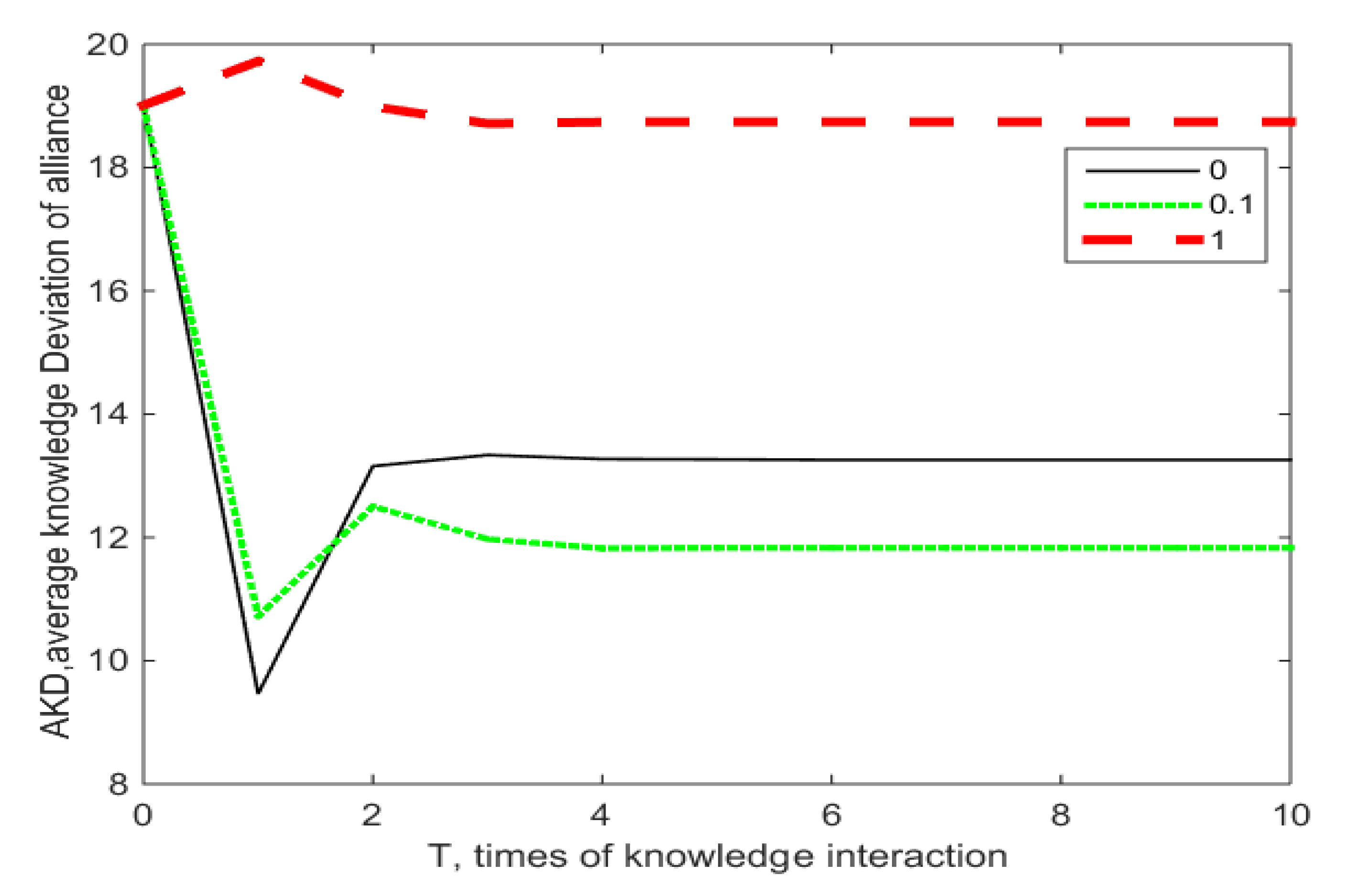
© 2020 by the authors. Licensee MDPI, Basel, Switzerland. This article is an open access article distributed under the terms and conditions of the Creative Commons Attribution (CC BY) license (http://creativecommons.org/licenses/by/4.0/).
Share and Cite
Tang, H.; Ma, Z.; Xiao, J.; Xiao, L. Toward a more Efficient Knowledge Network in Innovation Ecosystems: A Simulated Study on Knowledge Management. Sustainability 2020, 12, 6328. https://doi.org/10.3390/su12166328
Tang H, Ma Z, Xiao J, Xiao L. Toward a more Efficient Knowledge Network in Innovation Ecosystems: A Simulated Study on Knowledge Management. Sustainability. 2020; 12(16):6328. https://doi.org/10.3390/su12166328
Chicago/Turabian StyleTang, Houxing, Zhenzhong Ma, Jiuling Xiao, and Lei Xiao. 2020. "Toward a more Efficient Knowledge Network in Innovation Ecosystems: A Simulated Study on Knowledge Management" Sustainability 12, no. 16: 6328. https://doi.org/10.3390/su12166328
APA StyleTang, H., Ma, Z., Xiao, J., & Xiao, L. (2020). Toward a more Efficient Knowledge Network in Innovation Ecosystems: A Simulated Study on Knowledge Management. Sustainability, 12(16), 6328. https://doi.org/10.3390/su12166328




